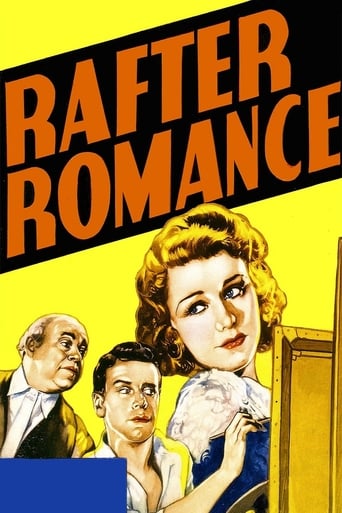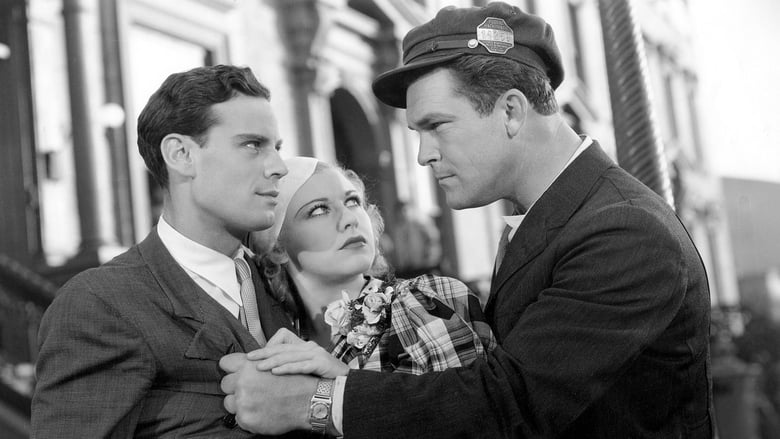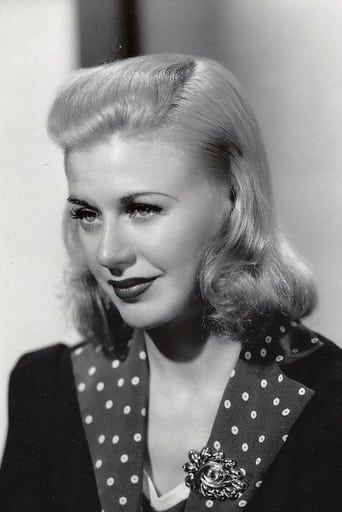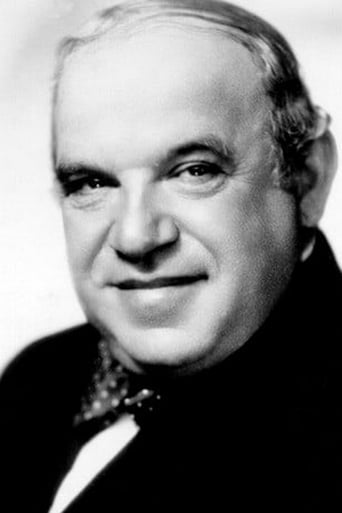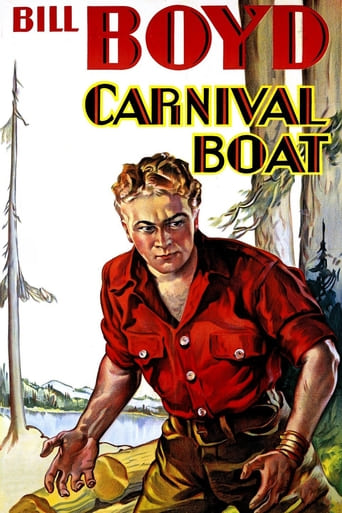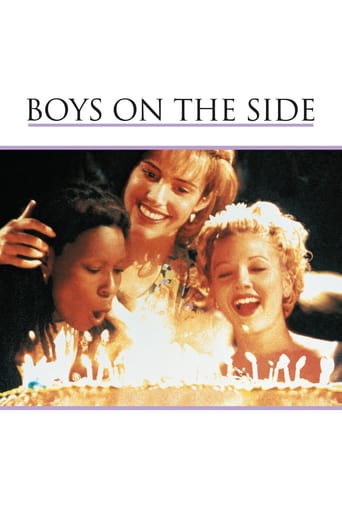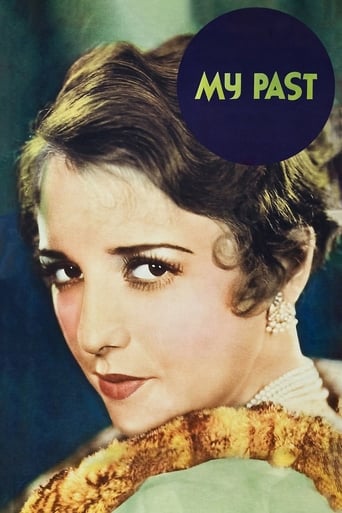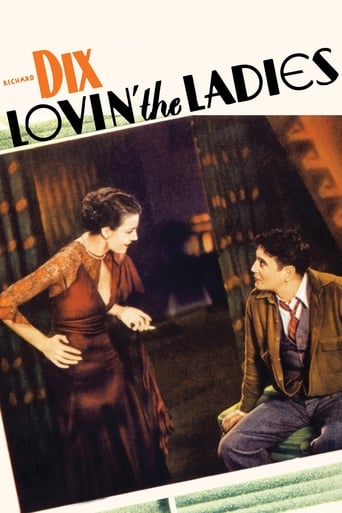Rafter Romance (1933)
A working girl shares her apartment with an artist, taking the place in shifts.
Watch Trailer
Free Trial Channels
Cast


Similar titles
Reviews
Absolutely the worst movie.
It's not great by any means, but it's a pretty good movie that didn't leave me filled with regret for investing time in it.
It really made me laugh, but for some moments I was tearing up because I could relate so much.
There's no way I can possibly love it entirely but I just think its ridiculously bad, but enjoyable at the same time.
It's the depression and everyone is hard up except the very wealthy. (Plus ca change...) Ginger Rogers is a working girl forced to share an attic or loft with Norman Foster, an artist who refuses to take any money from the society matron (Laura Hope Crews) who pursues him. George Sidney is Mr. Eckbaum, the slightly frantic landlord who tries to keep everything going. He arranges it so that Rogers, who is a telephone salesgirl by day, and Foster, who has a job as a night watchman, never meet. Trying to keep the place "respectable," you know.Well, the two roomies who don't know each other take a long time to meet. In the meantime, leaving nasty notes for one another and playing painful pranks, each comes to loathe the other.But -- guess what! -- they meet accidentally outside their attic, assume false identities for different reasons, and fall for each other. This plot, I'm sure, goes back farther than "You've Got Mail" or "The Shop Around the Corner." I honestly don't know how far back in the mists of ancient history it goes. When did they invent rentals? It's a bit slow at first. George Sidney is funny, though, as the wisecracking Jewish landlord. His son Julius brings him a bowl of noodle soup for the famished Rogers but spills some on the carpet. "Ahh, next time I ask you for TWO bowls of zoop -- one for the lady and one for the carpet." If you don't think that's funny, I ought to warn you that that's about as good as it gets.Robert Benchley is in it too, as the amorous boss of Rogers at the Icy Air Refrigerator Company, but his particularly Ivy League brand of humor may be an acquired taste. Except for "Foreign Correspondent," come to think of it, where his non sequiturs were superb. Guinn (Big Boy) Williams also appears in the small role of a comic taxi driver.Foster isn't much of an actor but Ginger Rogers is delightfully piquant as a tough but vulnerable proletarian. She has a wonderful figure, which she gets to display, but her movements are stiff and no one could have predicted that within the next few years she would be a partner in the most famous dancing team in the world.Everything about the movie is smooth and logical and never rises above the level of "nice" -- slightly amusing, slightly warm, and with a happy ending.
Had no idea that I was going to enjoy this old time 1933 comedy film starring Ginger Rodgers, (Mary Carroll) who lives in a rooming house and has fallen behind in her rent for about three months. Mary's landlord tells her she must moved out of her apartment and move upstairs in the attic until she finds a job. However, the landlord does not tell her she has to also share the attic apartment with a man named Jack Bacon, (Norman Foster) who is an artist-night watchman who has also fallen behind in his rent. Mary works during the day time and Jack shares the apartment in the day time and leaves at 8PM in the evening when Mary comes home. The two of them do not know each other and do not like each others habits or ways of living. During the day they meet and have no idea they are both sharing the same apartment. This is a very delightful comedy and worth watching. Enjoy!.
This delightful romantic comedy, unseen since 1959, shows how fresh and funny movies could be in 1933, the last year before the Hayes Production Code clamped down on the film industry and enforced mandatory wholesomeness -- banning anything that might "lower the moral standards of those who see it," including almost any reference to sex.Many pre-Code films look antiquated and creaky today, as the characters earnestly discuss sex, adultery, divorce, and other Serious Adult Topics. This one plays it all for a farce, with Ginger Rogers and Norman Foster forced by economics to share the same attic apartment in 12-hour shifts, him by day and her by night. They never meet and communicate only through increasingly nasty notes and pranks, coming to despise one another as roommates even as they're unknowingly flirting and falling in love in the outside world.At the same time, Rogers is trying to fend off the amorous advances of her boss (Robert Benchley), who sees a man entering her room as she's leaving with him and apparently assumes she's turning tricks on the side, while Foster is trying to discourage an elderly millionaire (Laura Hope Crews) who wants to take him away from his sordid life and bring him home with her as her boy-toy. In the final denouement, they're explaining to everyone that they're "not married, just living together," while trying to decide whether they actually love each other or hate each other. (Love, as you might suspect, wins out).
A previous IMDb reviewer has stated that 'Rafter Romance' is a 'rip-off' (that's the other reviewer's term) of a German musical called 'Me By Day, You By Night'. Apparently that reviewer is unaware that *both* of these films have borrowed their premise from 'Box and Cox', an English play written by John Maddison Morton in 1847. This play deals with two tradesmen who rent the same room from an unscrupulous landlady, each man believing himself the sole tenant. Because the two men have different work schedules, the ruse is not discovered straight away. This play was once so popular in Britain that 'to Box and Cox it' became a common term for an arrangement in which two people willingly shared accommodations meant for only one person.The innovation of 'Rafter Romance' (and its predecessor) is that the two tenants are now a man and a woman, who inevitably develop a romance. As is usual in these cornball movies, the guy and the gal detest each other until they fall into each other's arms. Hoo boy.The landlord in this film is played by George Sidney, a character actor who specialised in playing Jewish stereotypes that were meant to be sympathetic. George Sidney was never as annoying as the odious Harry Green (the Jewish equivalent of Stepin Fetchit) but Sidney's depictions of Jewish characters are still exaggerated and embarrassing to watch.The single most notable thing about 'Rafter Romance' is that, to my knowledge, this is the earliest Hollywood film to make reference to Hitler and the rise of Nazism. At one point in this movie, landlord Eckbaum (Sidney) discovers his teenage son Julius engaged in chalking swastikas on the walls. Eckbaum and his son are clearly meant to be Jewish. Admittedly, nobody in Hollywood in 1933 had any real idea of what Hitler was planning for the Jews in Europe ... still, it's surprising to see a film depicting a Jewish teenager who thinks that swastikas are a joke. His father is, quite properly, angered by this display of the Nazi symbol.A very shameful aspect of Hollywood history is the documented fact that all of the major Hollywood studios continued to do business with the Third Reich as late as 1939. Hollywood's leading ladies were medically documented as 'Aryan' so that their films could be distributed in Nazi Germany and Austria. For the same reason, Hollywood's leading men were documented as 'Aryan and uncircumcised'. Except for Darryl Zanuck at Twentieth Century-Fox, all the Hollywood studio executives who colluded in this policy were Jewish ... but clearly had no objection to doing business with Hitler. I'm surprised that 'Rafter Romance' contains a scene depicting swastikas unfavourably, as this sequence would have rendered the film Verboten in Germany and Austria. (Maybe the scene was cut out for German release: it isn't crucial to the movie's plot.) Apart from this, the movie contains nothing notable. Robert Benchley does his usual unfunny befuddled characterisation: I've never understood the appeal of this man. I'll rate 'Rafter Romance' 4 out of 10.

